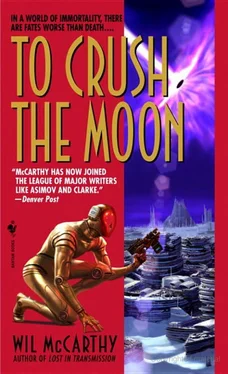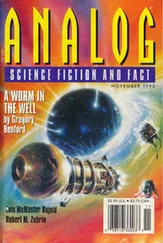“I am,” he assured her. “Very.” And it was true. “I’m just… I don’t know, more tired than anything. My willpower’s browning out. Which is bad, because there’s a lot of work still to be done. And a lot of refugees streaming homeward, expecting a place to live.”
At that, she patted him on the rump and smiled wickedly. “I know what you need, Architect. Around that withered soul you’re still young and virile. A body like that requires attention.” And that was true, too.
Although the planet had shrunk beneath it, Luna’s actual crust hadn’t gotten any smaller. But it had only one-fourth the area to cover, so over the years of its settling it had folded and wrinkled and cracked, raising jagged mountain chains, broad steppes, and vast, broken plains. Even here in the relative flat of the former Mare Nubium, it wasn’t hard to find a little valley so secluded that it would be visible only from directly above.
“We start pouring the oceans tomorrow,” he told his wife. “Faxed ice from Callisto, mostly. And for the first year or two the water will simply sink into all these voids in the crust. The surface will be as dry as ever, but with the water to lubricate them, and explosives to jar them loose, the rock plates should settle together, smoothing out all these jags and spines.”
“All?”
“Well, a lot of them. We still want some contour, obviously, and with the highest mountains reaching twelve whole kilometers above the plains, we’ll definitely still have some. But the geo boys are having the time of their lives, figuring out where to plant all the bombs. We’ll go after the biggest voids with subnukes and aye-ma’am, and over time the water will be squeezed back out to the surface. Truthfully, with a fixed mass budget we’re not sure how deep the oceans will be when it’s all said and done. But there’ll be enough to stabilize the climate and the ecosystem. And there’ll be beaches.”
“Sounds lovely,” Xmary said, in a we’re-done-talking-now kind of way. Her clothes, sensing the moment, peeled away and fell to the dusty ground. Conrad’s did likewise. Soon the two of them were on their clothes, rolling and wrestling, feeling the dry air soak up their sweat. The love they made together was excellent, as always.
There were more failed couples in the universe than successful ones, and conventional wisdom thus insisted that two people simply couldn’t get along forever. But Conrad had never understood this. He was barely old enough to deprogram facial hair when he’d met Xmary, and they’d become lovers within the year.
Later, they’d tried it apart for what seemed like a long time, but their flexibility hadn’t been up to the task. Like two trees that had grown together, they simply couldn’t disentangle. Not without damage, without broken hearts and limbs and skyward-pointing roots. And eternal youth or no, who had time to recover from a thing like that? Who would want to?
True love is immorbid, Conrad wrote once in his diary. You can kill it, but it never gets old. It’s stronger than petty anger or lust. Stronger even than boredom, and that’s a strong force indeed. Or maybe he, personally, was just weak. His love for Xmary belied any notion of free will; he could leave her, yes, but he couldn’t want to.
“I can’t imagine my life without you,” he told her now, murmuring into a sweaty ear.
“Enough,” she said. “Talk later. Let’s enjoy this planet of yours.”
The ground shook a little then, as if in agreement or—as Conrad would later see it—in warning.
And Xmary, perhaps sensing this, added, “While it’s still ours. Before the homeless arrive and things get interesting. It’s not enough to crush the moon; you’ve got to decide how you’re going to love it.”
Lune. The name—chosen democratically and ratified by royal decree—seemed strange, musical, and somehow appropriate. Lun a took twice as long to say, for a world twice as wide. “Ash,” by contrast, was a drab moniker for the outermost of this new world’s planettes, poised at the L1 Lagrange point and stabilized there by a network of orbiting collapsiters.
Ash itself, though, was anything but drab. The planette Varna, orbiting thirty thousand kilometers closer to Lune, was blue and green and steamy, like a little tropical Earth. Beneath that was the grassy Kishu and—visible just now off the limb of Lune—the desert Harst, glowing like a little beige pinpoint.
But Ash’s biosphere was dominated by reds and yellows: snapdragon and bougainvillea, cardinals and canaries, foxes and howler monkeys and fluorescent yellow mice. The trees were engineered specifically for the site, and were like nothing ever seen on Earth or in the colonies. Tall and sparse as autumn poplars, prickly as cacti, stronger and more flexible than bamboo, they rose from the dome-shaped ground like pillars of flame, waving brightly in the breeze.
And in Ash’s pearl-gray sky, the spectacular blue-green orbs of Earth and Lune were almost exactly equal in size. Their impending eclipse, two days hence, would see the glare of Sol line up perfectly behind the Earth, which would cast its shadow across Lune and turn it red as well. The red of sunset, of sunrise, of beginnings and endings.
And per the queen’s proclamation, the sixty-two minutes of the eclipse’s totality were to mark the formal opening of Lune to human settlement. But the queen had declined to run these dates by her architect laureate, and in Conrad’s professional opinion they were utter hooey. He’d been building that world for long years, and he needed another eighteen to complete the job properly. At least eighteen!
“Be realistic, Your Highness,” he said to Tamra, by the light of the sun and the Earth and of Lune itself. “Be reasonable. This party is several years premature.”
This was the official celebration, to which none of Conrad’s crew were invited, despite his strenuous objections. They were of course welcome to attend the public celebration during the actual eclipse, except that at full capacity the planette could comfortably hold only eighty thousand people, and for a construction worker the tickets would cost a year’s salary at least. So in fact they’d be watching the ceremony on TV, or via neural sensorium, or maybe just skipping it and going straight to their own drunken revelries. It seemed a shame.
“The official commencement will be a simple dinner party,” the queen’s invitation had told him primly, “for a few close friends and relations. Since your wife is also invited, you needn’t bring a guest. Her Majesty understands your concern, but is she to share her table with every rigger and wrench-boy in the Queendom? She loves them all equally, but she hasn’t the time to love them individually . She could dedicate a score of copies to that purpose alone, and never make a dent in the problem. And what would she do with the memories? Summarize them, or be hopelessly clogged, or forget them entirely. And wouldn’t that defeat the purpose?”
“Not for the workers,” he told it. “They’d treasure the experience forever.”
“Presumption is rude, Architect,” the invitation had chided. Then, “Come now, you owe the luminaries of Sol a chance to congratulate you.”
So here they were, seated at a pair of long, arch-shaped tables that followed the curve of Ash’s surface. Forty people, only half of whom Conrad knew at all well. But Feck was here, and Eustace, and a handful of other revived Barnardeans who’d made good in the stodgy old Queendom. The king was here too, of course, and so were Donald and Maybel Mursk and, rather surprisingly, Xmary’s parents as well.
Since Mimi and David Li Weng had disowned their daughter after the Revolt, Conrad had never actually met them. Nor wanted to, though it wasn’t a position he’d considered overmuch. They were historical figures more than anything, and though Xmary was largely ignoring them, their presence did lend an odd authority to the proceedings. Their daughter, the Governor Adjudicate of Central Pacifica and wife of a celebrated architect, was no longer an embarrassment to them.
Читать дальше












